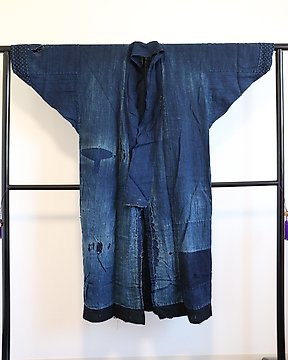
Boro 襤褸 - Textilien - Japan - Meiji Periode (1868-1912)
Nr. 83406989

Nr. 83406989

A captivating large six-panel byôbu 屏風 (room divider) with a refined Nanga School-style painting of a peaceful mountain landscape along a river. A large Chinese pavilion sits at the base of a tall towering cliff, next to a large curving pine tree 松 (matsu). A junk with fishing nets is docked near the complex.
This pavilion is looking over a small village in the distance, where several thatched roofs an figures are visible.
Across the wide river, even the rooftops of the next village can be seen.
This painting is made using black ink 墨 (sumi) on an goldish oxidized silver leaf background.
Silver leaf continuously undergoes the process of oxidation, which creates a beautiful aged patina.
The screen is signed in the lower left corner by an artist named Kômokuken 耕木軒.
Mounted by two silk borders, a thin blue and white one, and a broad brown one with a crane motif. Protected by a black lacquer frame with original hardware.
Considering its age in a good condition with traces of age, wear and old restorations (front and back), like some paper wear and restoration near the docked boat. Dent in the first panel. Dents in hardware. Please take a close look at the photos for a clear condition reference.
Period: Japan – Early Meiji period (Second half 19th century).
Dimensions:
Total width: 369.6 cm (2 x 63 cm, 4 x 60.9 cm), Height: 173 cm.
The folding screen is ideal for mounting flat on a wall and presenting as a single work of art.
Nanga (南画, "Southern painting"), also known as Bunjinga 文人画 ("literati painting"), is a style of literati painting that originated in 18th-century Japan. Influenced by Chinese literati traditions, Nanga artists expressed their appreciation for nature, poetry, and scholarly pursuits through ink wash paintings. It emphasized individualistic expression, simplicity, and the pursuit of personal enlightenment.
When shipped we will add a certificate of authenticity.
So kaufen Sie auf Catawiki
1. Etwas Besonderes entdecken
2. Höchstgebot abgeben
3. Sichere Zahlung durchführen